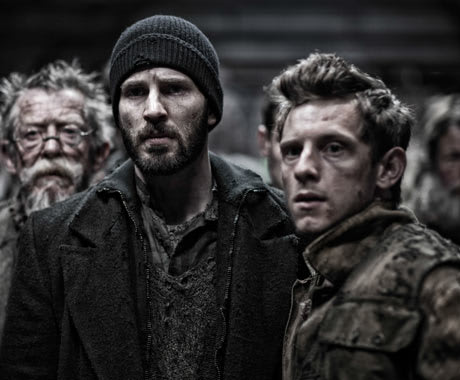Dystopian fictions are parables, basically. They necessarily take place in the future so that their themes resonate more strongly. They're warnings, harbingers. Bong Joon-ho's Snowpiercer, based on the graphic novel Le Transperceneige, is a stunning exemplar of the genre. Grim and violent, intelligent and human, it's a penetrating social commentary and a coal-black social satire all at once. It's a wonderful time at the movies.
In the near future, an effort to combat the effects of global warming has unwittingly brought about a new ice age that killed almost all life on Earth. The few human survivors live on a bullet train that circumnavigates the uninhabitable planet. Forever.
The train is an obvious metaphor for the class system. At the front are the first-class passengers: they eat, drink and dress well; they wield all the firepower and actual power. Those at the back end live in squalor, drink the rich folks' wastewater and eat gelatinous protein blocks (and before that, much worse) to survive.
Like others before them, Curtis (Chris Evans) and Edgar (Jamie Bell) are plotting a revolt with the help of their aged leader, Gilliam (John Hurt). They want to take the train over to make everything more equitable. To do so will require them breaking Namgoong (Song Kang-ho) out of jail. Namgoong built the system of doors separating the cars; breaking him out is essential to taking the train.
Among those against Curtis's revolution is Minister Mason (a barely-recognizable Tilda Swinton). Mason speaks for Wilford, the rarely seen billionaire who built the train, and stands for brutal order and everyone knowing their proper place. She looks and speaks like a caricatured Margaret Thatcher (Snowpiercer doesn't bother with nuanced politics; its radical leftism is pronounced).
Mason is a stand-in for classism, religious fundamentalism and violent conservatism. She represents something to be conquered or killed in the name of social progress. But do the people she represents? Or are they just benefiting from a rigged game?
The unforgettable, bloody clash between Curtis's lot and Mason's men near the film's midpoint is sensational. Bong Joon-ho does not protect us from it — he toothpicks our eyes open and makes us taste blood. It's the perfect counterpunch to non-action moments featuring the rich passengers' worship and reverence of benevolent, merciful Wilford and his "sacred" engine and the poor passengers' atheistic, grubby honour. He does this so well we feel complicit in the narrative; we taste the grit between Curtis's teeth and feel Edgar's anger. We walk into the third act having willfully taken a side.
Without blowing the third act (which would be unforgivable) I'll say that what separates Snowpiercer from other films of this nature is its sense of reality. What looks like a clear-cut case of us vs. them is in fact something more complex, because people are complex, and the reasons we violate and subjugate others is complex. It takes an incredibly talented filmmaker to deny us the easy answers we are used to while satisfying us with an ending that speaks to the truths of who we are as people, but Bong Joon-ho, with Snowpiercer, is equal to the task.
(eOne)In the near future, an effort to combat the effects of global warming has unwittingly brought about a new ice age that killed almost all life on Earth. The few human survivors live on a bullet train that circumnavigates the uninhabitable planet. Forever.
The train is an obvious metaphor for the class system. At the front are the first-class passengers: they eat, drink and dress well; they wield all the firepower and actual power. Those at the back end live in squalor, drink the rich folks' wastewater and eat gelatinous protein blocks (and before that, much worse) to survive.
Like others before them, Curtis (Chris Evans) and Edgar (Jamie Bell) are plotting a revolt with the help of their aged leader, Gilliam (John Hurt). They want to take the train over to make everything more equitable. To do so will require them breaking Namgoong (Song Kang-ho) out of jail. Namgoong built the system of doors separating the cars; breaking him out is essential to taking the train.
Among those against Curtis's revolution is Minister Mason (a barely-recognizable Tilda Swinton). Mason speaks for Wilford, the rarely seen billionaire who built the train, and stands for brutal order and everyone knowing their proper place. She looks and speaks like a caricatured Margaret Thatcher (Snowpiercer doesn't bother with nuanced politics; its radical leftism is pronounced).
Mason is a stand-in for classism, religious fundamentalism and violent conservatism. She represents something to be conquered or killed in the name of social progress. But do the people she represents? Or are they just benefiting from a rigged game?
The unforgettable, bloody clash between Curtis's lot and Mason's men near the film's midpoint is sensational. Bong Joon-ho does not protect us from it — he toothpicks our eyes open and makes us taste blood. It's the perfect counterpunch to non-action moments featuring the rich passengers' worship and reverence of benevolent, merciful Wilford and his "sacred" engine and the poor passengers' atheistic, grubby honour. He does this so well we feel complicit in the narrative; we taste the grit between Curtis's teeth and feel Edgar's anger. We walk into the third act having willfully taken a side.
Without blowing the third act (which would be unforgivable) I'll say that what separates Snowpiercer from other films of this nature is its sense of reality. What looks like a clear-cut case of us vs. them is in fact something more complex, because people are complex, and the reasons we violate and subjugate others is complex. It takes an incredibly talented filmmaker to deny us the easy answers we are used to while satisfying us with an ending that speaks to the truths of who we are as people, but Bong Joon-ho, with Snowpiercer, is equal to the task.
